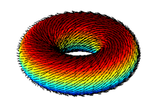UnNews:Astronomers "love pink" on newest find
| We have met the enemy, and he is us | ✪ | UnNews | ✪ | Friday, February 20, 2026, 22:14:59 (UTC) |
| Astronomers "love pink" on newest find | 
|
27 March 2014
LOS ANGELES, California -- Astronauts have found a second frozen world beyond Pluto.
Though the first, named Sedna when it was discovered in 2003, was bright red, the new object is pink. Yale researcher David Rabinowitz said, "Sedna was not a freak. There could be hundreds more of these," presumably in dozens of designer colors. Which is promising, as the only other thing one can do with a Ph.D. is drive a taxi. The new find, like Sedna, is in the "inner Oort cloud," a Scottish term that refers to the fact that it is way oort there. There is also an ooter Oort cloud, which is even further oort.
Mike Brown, an astronomer at California Institute of Technology who claims he demoted Pluto from planet-hood and is at no risk at all of having to bid for a taxi medallion, could only say, "So what?"
The new celestial body is designated VP113. Scientists, by playing word-association on "V.P.," have given it the nickname Biden, in view of its unlikely potential to persuade anyone of anything. Biden has a diameter of 280 miles, summers there reach balmy highs of −430 degrees Fahrenheit, and prowlers and burglars there can be scared off with shotguns. Despite it being 42,000 million miles from Earth, Glenn Beck has already organized a cruise of his talk radio audience. They will venture to the chilly planetoid, exchange anecdotes about Barack Obama and the pratfalls of his health care website, and look forward to a massive electoral shift in 2014, achieved merely by mass loathing, which always occurs, except in 2012, when it didn't.
In a separate discovery, published in the dodgy scientific press independent of UnNews, a team of researchers in Brazil found two rings on an asteroid-sized planetoid named Charisma Carpenter. This is the first time rings have been found apart from planets such as Uranus, which is a gas giant.
Sources[edit]
- Alicia Chang "Newfound pink world lurks at solar system fringes". Associated Press, March 26, 2014
